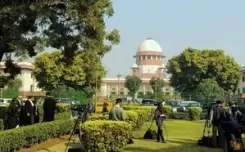Why Did the Supreme Court Decline to Include Political Parties Under the POSH Act?

Synopsis
Key Takeaways
- The Supreme Court has refused to include political parties under the POSH Act.
- Concerns have been raised about the lack of protection for women in politics.
- The ruling highlights gaps in the definition of “workplace.”
- The Kerala High Court's interpretation limits protections for women in informal sectors.
- Women in public life continue to fight for equality and safety.
New Delhi, Sep 15 (NationPress) The Supreme Court has, on Monday, declined to consider a petition aimed at including women working in the political sphere under the safeguards provided by the anti-sexual harassment legislation.
A Bench comprising Chief Justice of India (CJI) B.R. Gavai, along with Justices K Vinod Chandran and Atul S Chandurkar, expressed skepticism regarding how political parties could be classified as a “workplace” as defined by the POSH Act, noting that an employer-employee relationship does not exist between a party and its associates.
The Special Leave Petition (SLP), submitted by advocate Yogamaya MG, contested a decision made in March 2022 by the Kerala High Court. This ruling had adopted a “narrow and restrictive interpretation” of the Sexual Harassment of Women at Workplace (Prevention, Prohibition and Redressal) Act, 2013 (POSH Act).
The Kerala High Court concluded that political parties, along with similar organizations, are not required to establish Internal Complaints Committees (ICCs) due to the absence of a traditional employer-employee dynamic.
The SLP maintained that this ruling excluded “large categories of women involved in non-traditional, informal, or freelance jobs — especially within the film, media, and political spheres — from the safeguards of the Act.”
The petition highlighted that the POSH Act, designed in alignment with the Supreme Court’s pivotal ruling in the Vishaka v. State of Rajasthan case, was meant to be broadly applicable.
“The definitions of 'employer', 'employee', and 'workplace' were intentionally crafted to be comprehensive, reflecting the beneficial intentions of the legislation,” the petition detailed.
However, the SLP argued that the Kerala High Court's interpretation counteracted this purpose by asserting that ICCs are mandated solely for film production establishments with over ten employees, but not for industry associations such as AMMA or FEFKA.
“This not only undermines the objective of the POSH Act but also infringes upon fundamental rights under Articles 14, 15, 19(1)(g), and 21 of the Constitution,” it stated.
The SLP requested the Supreme Court to include all women “working in environments where de facto organizational control is exercised — whether by production associations in cinema or by political parties in the political domain.”
“If this Hon'ble Court does not intervene, women across significant sectors of public life will persist in being denied their rights to equality, dignity, and a secure work environment,” the petition asserted.
The SLP sought a ruling declaring that political parties and industry associations are encompassed by the POSH Act, along with directives for establishing effective ICCs or sector-specific grievance mechanisms.
Last month, a CJI Gavai-led Bench dismissed a Public Interest Litigation (PIL) aimed at including political parties under the POSH Act.
Nevertheless, the apex court suggested the PIL petitioner challenge the Kerala High Court's ruling independently by submitting an SLP to the Supreme Court.
In December of the previous year, the apex court had discarded a comparable petition but directed the petitioner to approach the Election Commission of India (ECI), emphasizing that the election body is the appropriate authority to encourage recognized political parties to implement an internal mechanism for addressing sexual harassment complaints.







